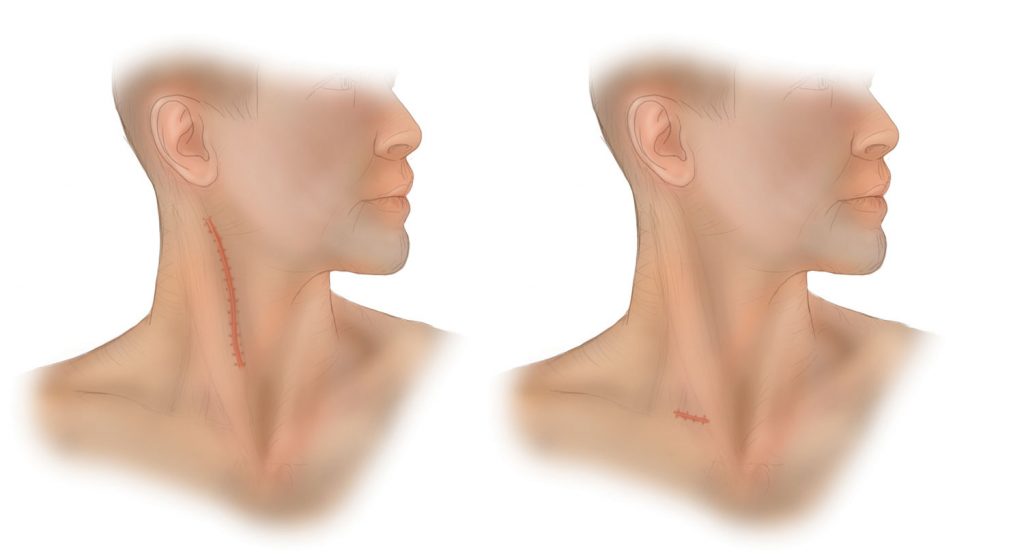News Releases
Virginia Mason First in State to Offer Safer Treatment for Preventing Stroke

The TCAR procedure requires a smaller incision (right) than traditional carotid endarterectomy and can be performed more often using local anesthesia. With a smaller incision, cranial nerve injury rates are reduced and scarring is minimized. Illustrations courtesy of Silk Road Medical SEATTLE – (Nov. 23, 2016) – Vascular surgeons at Virginia Mason are the first in Washington state and among the first in the nation to perform a new, minimally invasive procedure called transcarotid artery revascularization (TCAR) to treat carotid artery disease and prevent stroke.
During the procedure, a small incision is made above the collarbone to gain access to the blocked artery. Blood flow is temporarily reversed in the carotid artery to divert dangerous debris away from the brain, preventing a stroke during the procedure. A stent is then implanted in the carotid artery to treat the blockage and reduce the risk for stroke in the future. This innovative procedure is performed under local anesthesia, minimizes the rate and severity of nerve injury, reduces scarring and speeds the patient’s recovery.
The traditional treatment for carotid artery disease involves an open surgery called carotid endarterectomy. This treatment is effective in preventing stroke but carries risks of other surgical complications and injury to nerves near the large surgical incision. Any treatment of the carotid artery has some risk of a stroke as a result of the repair itself. The TCAR procedure now offered at Virginia Mason decreases these risks.
“To treat carotid disease with a less-invasive method that potentially offers a better safety profile than traditional surgery is exciting,” said vascular surgeon Nathan Aranson, MD. “Our goal is to treat the blockage with as little procedural risk as possible so that our patients can return to full and productive lives.”
In addition to Dr. Aranson, vascular surgeons performing the TCAR procedure at Virginia Mason are Damon Pierce, MD, and Derek Nathan, MD.
Stroke is a leading cause of death and life-altering disability in the United States. Every year, more than 300,000 people in the nation are diagnosed with narrowing plaques, or blockages, in their carotid artery. If left untreated, these blockages can fragment, flow to the brain, and cause a potentially disabling stroke also known as a “brain attack.”
Individuals who undergo TCAR at Virginia Mason also have the opportunity to participate in a special research study related to the procedure. “Everyone undergoing the procedure will be offered enrollment in a study with extra monitoring and data collection. It is our constant goal to increase the level of safety and improve outcomes for our patients,” Dr. Pierce said.
For more information or to schedule an appointment, call the Virginia Mason Vascular Center at (206) 223-6950.
About Virginia Mason Health System
Virginia Mason, founded in 1920, is a nonprofit regional health care system based in Seattle that serves the Pacific Northwest. In the Puget Sound region, the system includes 336-bed Virginia Mason Hospital; a primary and specialty care group practice of more than 500 physicians; regional medical centers in Seattle, Bainbridge Island, Bellevue, Federal Way, Kirkland, Issaquah and Lynnwood; Bailey-Boushay House, the first skilled-nursing and outpatient chronic care management program in the U.S. designed and built specifically to meet the needs of people with HIV/AIDS; Benaroya Research Institute, which is internationally recognized for autoimmune disease research; and Virginia Mason Institute, which trains health care professionals and others from around the world in the Virginia Mason Production System, an innovative management methodology for continually improving quality, safety and efficiency. Virginia Mason online: VirginiaMason.orgVirginia Mason Health System also includes Virginia Mason Memorial, a 226-bed hospital serving the Yakima Valley in Central Washington since 1950. Memorial online: YakimaMemorial.org
Media Contact:
Gale Robinette
Media Relations Manager
Virginia Mason Health System
(206) 341-1509
gale.robinette@VirginiaMason.org